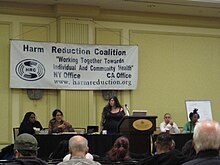National Harm Reduction Coalition

The National Harm Reduction Coalition, previously known as the Harm Reduction Coalition, is an American harm reduction advocacy group.[1]
History
The NHRC emerged from a Harm Reduction Working Group (HRWG) organized in 1993 by Francie and Stephanie Comer, Dan Bigg, George Clark (head of San Francisco's needle exchange), and Dave Purchase.[2] Many of the attendees at the first meeting had worked with (or founded) needle exchanges in different cities, including Los Angeles, San Francisco, Philadelphia and New York.[3] Many were current or former injection drug users.[4] Several of the HRWG's original participants had also been involved with ACT UP.[5] Participants in the HRWG's first meeting agreed on the following definition of harm reduction:[6]
Harm Reduction is a set of strategies and tactics which encourages users to reduce harm done to themselves and their communities by licit and illicit drug use. By allowing users access to the tools to become healthier, we recognize the competency of their efforts to protect themselves, their loved ones, and their communities.
The HRC itself was founded in San Francisco in 1994, moving to New York City soon after.[1] 700 people attended the HRC's first conference, held in Oakland in 1996.[7] The HRC was initially led by George Clark.[8] Allan Clear was the NHRC's executive director from 1995 until 2016, when he left to take a job in the New York State government.[9][1]
References
- ^ a b c Richardson, Lynda (3 March 2004). "PUBLIC LIVES; from Punk Rock and Drugs to the War on H.I.V." The New York Times.
- ^ Szalavitz 153
- ^ Szalavitz 153-55
- ^ Szalavitz 153
- ^ Szalavitz 153-54
- ^ Szalavitz 156
- ^ Szalavitz 186
- ^ "Two Decades of Positive Change: A Brief History of the Harm Reduction Coalition - Comer Family Foundation (En-US)".
- ^ "Allan Clear is New York State Director of Drug User Health". Poz. 8 December 2015.
Sources
- Szalavitz, Maia. Undoing Drugs: How Harm Reduction is Changing the Future of Drugs and Addiction. Hachette Books. 2022.
